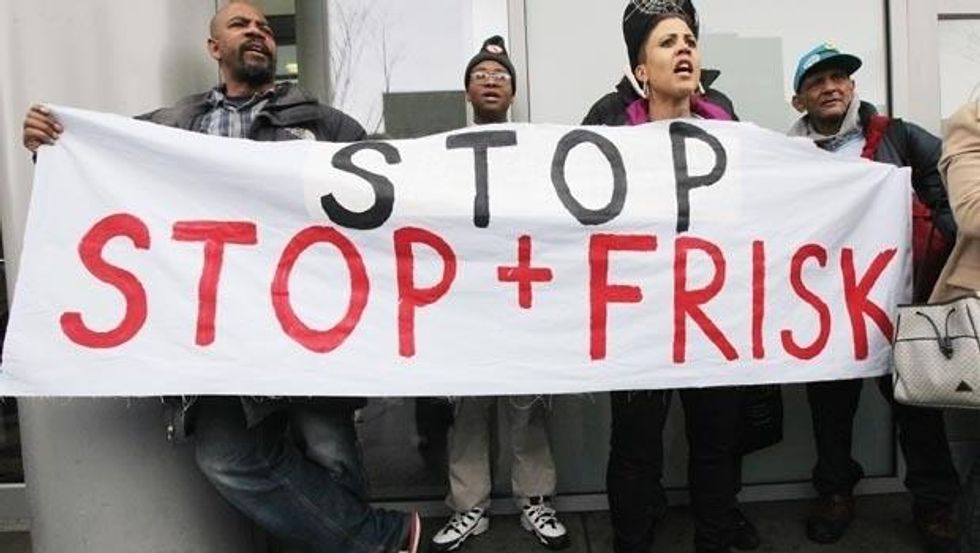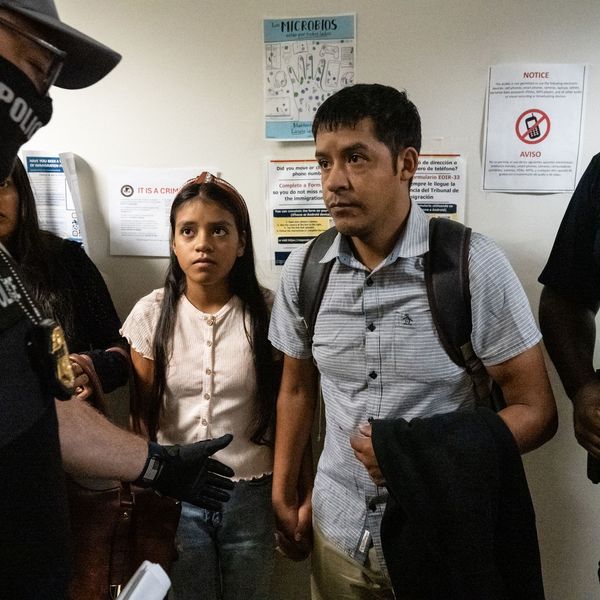'Victory for all New Yorkers': Federal Judge Rules Stop-and-Frisk 'Unconstitutional'
As stop-and-frisk not completely abolished, constitutional rights group says much work to be done

The ruling was deemed a victory by the Center for Constitutional Rights who represented the lead plaintiff David Floyd in the case Floyd, et al. v. City of New York, et al.
According to a group statement, CCR declared:
Today is a victory for all New Yorkers. After more than 5 million stops conducted under the current administration, hundreds of thousands of them illegal and discriminatory, the NYPD has finally been held accountable. It is time for the City to stop denying the problem and work with the community to fix it.
Federal Judge Shira A. Scheindlin concluded in her opinion that in supporting the controversial tactic, the NYPD had "turned a blind eye to the evidence that officers are conducting stops in a racially discriminatory manner."
She added, "No one should live in fear of being stopped whenever he leaves his home to go about the activities of daily life."
As was highlighted throughout the course of the trial, the NYPD's stop-and-frisk tactics led to 5 million stops of mostly black and Latino men since 2004--the bulk of whom had neither committed a crime nor done anything to warrant suspicion from the police. As the court heard, 90 percent of those stopped after 2004 were found innocent.
Scheindlin, however, did not order a complete embargo on stop-and-frisk.
Rather than ending the practice, Scheindlin designated an outside lawyer, Peter L. Zimroth, to monitor the NYPD's actions and to ensure stop-and-frisk procedures are in compliance with the U.S. Constitution.
Scheindlin also ordered at least five police precincts across the city to wear body-worn cameras in an effort to record their street encounters as well as a "joint remedial process" which will include a series of community meetings "to solicit public input on how to reform stop-and-frisk," as the New York Times reports.
As CCR warned Monday, the NYPD "won't change overnight," urging that there is much work to be done in the "police accountability movement" to ensure the NYPD abides by the court ruling.
City officials have not said whether they plan to appeal.
_______________________
An Urgent Message From Our Co-Founder
Dear Common Dreams reader, The U.S. is on a fast track to authoritarianism like nothing I've ever seen. Meanwhile, corporate news outlets are utterly capitulating to Trump, twisting their coverage to avoid drawing his ire while lining up to stuff cash in his pockets. That's why I believe that Common Dreams is doing the best and most consequential reporting that we've ever done. Our small but mighty team is a progressive reporting powerhouse, covering the news every day that the corporate media never will. Our mission has always been simple: To inform. To inspire. And to ignite change for the common good. Now here's the key piece that I want all our readers to understand: None of this would be possible without your financial support. That's not just some fundraising cliche. It's the absolute and literal truth. We don't accept corporate advertising and never will. We don't have a paywall because we don't think people should be blocked from critical news based on their ability to pay. Everything we do is funded by the donations of readers like you. Will you donate now to help power the nonprofit, independent reporting of Common Dreams? Thank you for being a vital member of our community. Together, we can keep independent journalism alive when it’s needed most. - Craig Brown, Co-founder |
Jacob Chamberlain is a former staff writer for Common Dreams. He is the author of Migrant Justice in the Age of Removal. His website is www.jacobpchamberlain.com.

The ruling was deemed a victory by the Center for Constitutional Rights who represented the lead plaintiff David Floyd in the case Floyd, et al. v. City of New York, et al.
According to a group statement, CCR declared:
Today is a victory for all New Yorkers. After more than 5 million stops conducted under the current administration, hundreds of thousands of them illegal and discriminatory, the NYPD has finally been held accountable. It is time for the City to stop denying the problem and work with the community to fix it.
Federal Judge Shira A. Scheindlin concluded in her opinion that in supporting the controversial tactic, the NYPD had "turned a blind eye to the evidence that officers are conducting stops in a racially discriminatory manner."
She added, "No one should live in fear of being stopped whenever he leaves his home to go about the activities of daily life."
As was highlighted throughout the course of the trial, the NYPD's stop-and-frisk tactics led to 5 million stops of mostly black and Latino men since 2004--the bulk of whom had neither committed a crime nor done anything to warrant suspicion from the police. As the court heard, 90 percent of those stopped after 2004 were found innocent.
Scheindlin, however, did not order a complete embargo on stop-and-frisk.
Rather than ending the practice, Scheindlin designated an outside lawyer, Peter L. Zimroth, to monitor the NYPD's actions and to ensure stop-and-frisk procedures are in compliance with the U.S. Constitution.
Scheindlin also ordered at least five police precincts across the city to wear body-worn cameras in an effort to record their street encounters as well as a "joint remedial process" which will include a series of community meetings "to solicit public input on how to reform stop-and-frisk," as the New York Times reports.
As CCR warned Monday, the NYPD "won't change overnight," urging that there is much work to be done in the "police accountability movement" to ensure the NYPD abides by the court ruling.
City officials have not said whether they plan to appeal.
_______________________
Jacob Chamberlain is a former staff writer for Common Dreams. He is the author of Migrant Justice in the Age of Removal. His website is www.jacobpchamberlain.com.

The ruling was deemed a victory by the Center for Constitutional Rights who represented the lead plaintiff David Floyd in the case Floyd, et al. v. City of New York, et al.
According to a group statement, CCR declared:
Today is a victory for all New Yorkers. After more than 5 million stops conducted under the current administration, hundreds of thousands of them illegal and discriminatory, the NYPD has finally been held accountable. It is time for the City to stop denying the problem and work with the community to fix it.
Federal Judge Shira A. Scheindlin concluded in her opinion that in supporting the controversial tactic, the NYPD had "turned a blind eye to the evidence that officers are conducting stops in a racially discriminatory manner."
She added, "No one should live in fear of being stopped whenever he leaves his home to go about the activities of daily life."
As was highlighted throughout the course of the trial, the NYPD's stop-and-frisk tactics led to 5 million stops of mostly black and Latino men since 2004--the bulk of whom had neither committed a crime nor done anything to warrant suspicion from the police. As the court heard, 90 percent of those stopped after 2004 were found innocent.
Scheindlin, however, did not order a complete embargo on stop-and-frisk.
Rather than ending the practice, Scheindlin designated an outside lawyer, Peter L. Zimroth, to monitor the NYPD's actions and to ensure stop-and-frisk procedures are in compliance with the U.S. Constitution.
Scheindlin also ordered at least five police precincts across the city to wear body-worn cameras in an effort to record their street encounters as well as a "joint remedial process" which will include a series of community meetings "to solicit public input on how to reform stop-and-frisk," as the New York Times reports.
As CCR warned Monday, the NYPD "won't change overnight," urging that there is much work to be done in the "police accountability movement" to ensure the NYPD abides by the court ruling.
City officials have not said whether they plan to appeal.
_______________________

